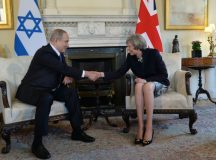In July 2018, an opinion piece in the Jewish Chronicle identified ‘fundamental questions which must now be urgently asked’ in light of what it termed the ‘potentially seismic change’ indicated by recent developments within the Anglo-Jewish community and its relationship to Israel. The Fathom editors believe there is a place for the journal to provide a platform to some of the voices in this debate to express their views. In this context, Fathom invited Mick Davis, Rabbi Laura Janner-Klausner, Dr Keith Kahn-Harris, Dr Toby Greene, Robin Moss, Simon Gordon, Tamara Berens, Jonathan Hunter, Hannah Weisfeld and Maya Ilany to share their opinions. Download the full symposium here.
Fathom Journal: The Jewish Chronicle (JC) posed the question ‘what exactly is the centre ground for British Jews on Israel now?’ How would you answer that question?
Tamara Berens: Most of the community would agree that the state has a right to exist as a homeland for the Jewish people. However, views on the character of the state differ vastly. This is fitting if we consider the wide variety of views that currently exist within Israel in response to the social and political challenges the state faces.
FJ: What kinds and forms of criticism of / engagement by British Jews with Israel and Israeli policy and practice do you consider acceptable / most effective, and which are unacceptable / least effective?
TB: The least effective criticism and engagement by British Jews with Israel is when critical opinions are voiced within the wider British political sphere, including attempts to lobby the British government to put pressure on the Israeli government. Those who engage with Israel through the British political sphere instead of the Israeli one are hypocritically bypassing a relationship that could be easily developed within the Israeli political sphere, where British-Jewry can pursue their critiques and alternative policy proposals with a greater likelihood of success. For example, Yachad’s recent student campaign against Israeli housing demolitions has been directed specifically at Middle East Minister Alistair Burt. The reality is that British government policy has very little clout when it comes to influencing Israel’s national security. When British Jews direct their criticisms of Israel at the British government, it often comes across as a self-serving cry for attention, rather than a legitimate tactic for bringing about change in Israeli politics. Yachad do appear to have directed some of the campaign at Israeli officials, but in order to enact the policy changes they want, solely focusing on Israeli officials would be both more effective and more ethical.
Unacceptable criticisms of Israel by British Jews include those that relate to Israel’s national security or defence policy, which are areas where the Jewish diaspora should not have a role in influencing. Those who have not served in the Israel Defence Forces (IDF) cannot claim to have the insight or tangible experience necessary to comprehend the security challenges the state faces.
Israel being a small regional power – whose grand strategy is largely defined by the existential threats it faces from its neighbours – mean that its policies are nowhere near as consequential as one might be led to believe from the actions of some British Jews. Israel does not pose a significant threat to the Palestinians, especially in comparison to the perilous and sometimes genocidal conflicts erupting across the rest of the Middle East. It is clear that for the moment, Israel seeks to perpetuate the ‘status quo’ and is not considering launching into a consequential war which might involve significant loss of life. There is therefore no reason why British Jews who have not served in the IDF, and are not experts in wider military affairs, should feel that their opinions on Israeli national security merit attention from either the Israeli or British political sphere.
In addition, when lobbying the British government or attempting to influence the public, British Jews often seem to misguidedly take cues from leftist Israeli organisations such as B’Tselem, which focus on Israeli human rights issues. Left-wing Israeli organisations have a right to focus their attention solely on Israeli shortcomings because they are critiquing the actions of their own government, with the aim of bringing about change in Israeli policy. However, British-Jewish organisations, who are lobbying the British government to take action against Israel, would be more ethical if they focused their attention on bringing a more balanced perspective on Israeli-Palestinian human rights abuses to the fore.
Acceptable engagement with Israel by British-Jews includes engaging with aspects of Israeli society and/or government policy pertaining to religious freedoms and the treatment of non-orthodox Jews. The best practice for engaging with such policies would be spending time in Israel, or engaging with other Israeli institutions, to influence policy within an Israeli forum.
FJ: What responsibilities do British Jews have – if any – to not give a tail wind to those who would demonise Israel, and how should they avoid doing so in practice?
TB: Jeremy Corbyn’s leadership of the Labour Party poses an existential threat to British Jewry. His attitude towards antisemitism stems directly from his foreign policy outlook and beliefs about Israel. In this current environment, British Jews have a responsibility to avoid giving the Labour party any excuse to brush off their culpability in antisemitism. British Jews who demonise Israel in a public forum often – either purposefully or accidentally – provide the hard-left with easy justifications for antisemitic attacks against Israel or British Jews. The definition of demonise, according to the Cambridge dictionary is: ‘to try to make someone or a group of people seem completely evil’. Demonisation, with regards to Israel, occurs where disproportionate focus is made on Israeli actions as an obstruction to peace and justice. This leaves the impression that Israel is solely responsible for the Arab-Israeli conflict and can lead many to believe that it must therefore be an evil entity. British Jews have a responsibility to uphold a proportional, rational perspective on where culpability lies with regards to the conflict.
FJ: To what extent do you agree with the assertion that there is a ‘potentially seismic change’ in the way that British Jewry discusses and feels about Israel?
TB: At this point in time, I don’t feel there has yet been a seismic change. However, such a change may come if our communal institutions do not continue to take a firm stance against events such as ‘Kaddish for Gaza’. Jews should be able to speak freely in public about any issue they choose. Nonetheless, it is the proper role of communal leadership to take a moral stance and condemn actions that it deems normatively problematic. They could do so both by issuing statements and by barring figures involved with events such as ‘Kaddish for Gaza’ from taking on communal leadership roles. It is important for Jewish leadership figures and organisations to set an example for the rest of the community and affirm that Israel is an integral part of Jewish identity, and a place that should command respect from Jews worldwide.










































Tamara Berens. and Simon Gordon
have the pulse of the Jewish community in the UK
Toby Green also to some extent
The others are well meaning but naive and understand only théir world view.
Was there not an Orthodox Rabbi available ?
And /or a really mainstream Zionist leader or writer ?
Even Rabbis. Kimche ,, Shaw of Mizrachi UK ,. Kanterowitz or Shocket
Could do better